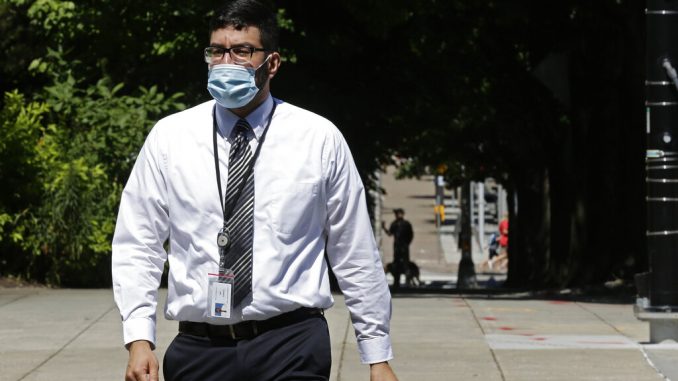
Many local and state officials have in the past two months mandated the use of masks and cloth face coverings. North Carolinians have become familiar with the state’s “3 W’s” campaign to help slow the spread of COVID-19. The move to masks did reverse earlier guidance at the onset of the pandemic.
In March this year Dr. Anthony Fauci, the head of the National Institute of Allergy and Infectious Diseases said on 60 Minutes, “There’s no reason to be walking around with a mask. Masks are important for someone who’s infected to prevent them from spreading the virus,” Fauci said at the time.
Fauci continued, saying, “When you’re in the middle of the outbreak it might make people feel better, but its not providing the perfect protection people think that it is. Often, there are unintended consequences, people fiddling with them and touching their face.”
Yet in the months following and as confirmed cases continued, the demand that governments mandate citizens wear masked became the accepted practice. The CDC now recommends that people wear cloth face coverings in public settings and when around people who don’t live in your household, especially when other social distancing measures are difficult to maintain, that cloth face coverings may help prevent people who have COVID-19 from spreading the virus to others, and cloth face coverings are most likely to reduce the spread of COVID-19 when they are widely used by people in public settings.
The CDC’s guidance does highlight those who should not wear masks. Among them are people who are deaf or hard of hearing and people with intellectual and developmental disabilities, mental health conditions or other sensory sensitivities.
The CDC also says younger children, those engaged in activities that may cause a cloth face covering to become wet, people who are engaged in high intensity activities, like running, those who work in a setting where cloth face coverings may increase the risk of heat-related illness or cause safety concerns due to introduction of a hazard, and outdoor workers.
A newer debate is also taking shape: masks vs. face shields.
An NBC News report said experts are divided on how well they protect against coronavirus droplets. New York state counts them as an option in lieu of masks.
“People who wear these homemade cloth masks are invariably touching their face constantly to adjust it, and we know that touching your face is one routine mechanism for infecting you,” said Dr. Amesh Adalja, a senior scholar at the Johns Hopkins University Center for Health Security. “When you’re wearing a face shield, you’re less likely to touch your face.”
Face shields are also more comfortable for breathing and talking, Adalja said.
The author of a 2014 study in the Journal of Occupational and Environmental Hygiene, William Lindsley, said the general public should stick to cloth face coverings.
“A cloth mask or a medical mask is going to do a better job of protecting you against the smaller particles than a face shield would,” Lindsley said. “A face shield is good against the really big stuff [particles] that you can kind of see. But as the stuff gets smaller and smaller, it’s just easy for that to go around the face shield and be inhaled.”
The 2014 study analyzed how well face shields block aerosol droplets. By using cough simulators, researchers found that face shields reduced exposure to inhaling cough droplets by 96 percent.
UC San Francisco infectious disease specialist Peter Chin-Hong said “I think there’s enough evidence to say that the best benefit is for people who have COVID-19 to protect them from giving COVID-19 to other people.”
Chin-Hong also said in an April 2020 simulation, international researchers predicted that 80% of the population wearing masks would do more to reduce COVID-19 spread than a strict lockdown.
The heavy use of masks is questioned by Dr. Ben Killingley, consultant in acute medicine and infectious diseases at University College London hospital. Killingley said in an interview with the London-based Mirror while people can wear masks to try to avoid being infected, the evidence that this is helpful is ‘weak.’
He explained: “Studies done where household members wear a mask to protect themselves from an influenza infected household member did not find masks to be helpful overall. Possible reasons for this are that people find it difficult to be compliant with mask use all of the time and that people may start wearing the masks too late,” Killingley says.
“The other problem with the public wearing masks is that they do not have the resources available to ensure their safe use – changing them fairly often, hand hygiene frequently, taking them off safely and disposing of them safely. Wearing a mask to walk down the street without coming into close contact with anyone else has no benefit at all and simply wastes resources. There is no evidence at all that the virus could or would exist in infectious amounts in outside air.”
“We should also remember that face masks are not an infinite resource and should be reserved for when they are most effective. It would not be good if we were not able to provide masks to healthcare workers because the public had consumed supplies,” Killingley continued.
In North Carolina, Gov. Roy Cooper’s executive order mandating masks is set to expire on July 17. It is unclear if the requirement will continue.


